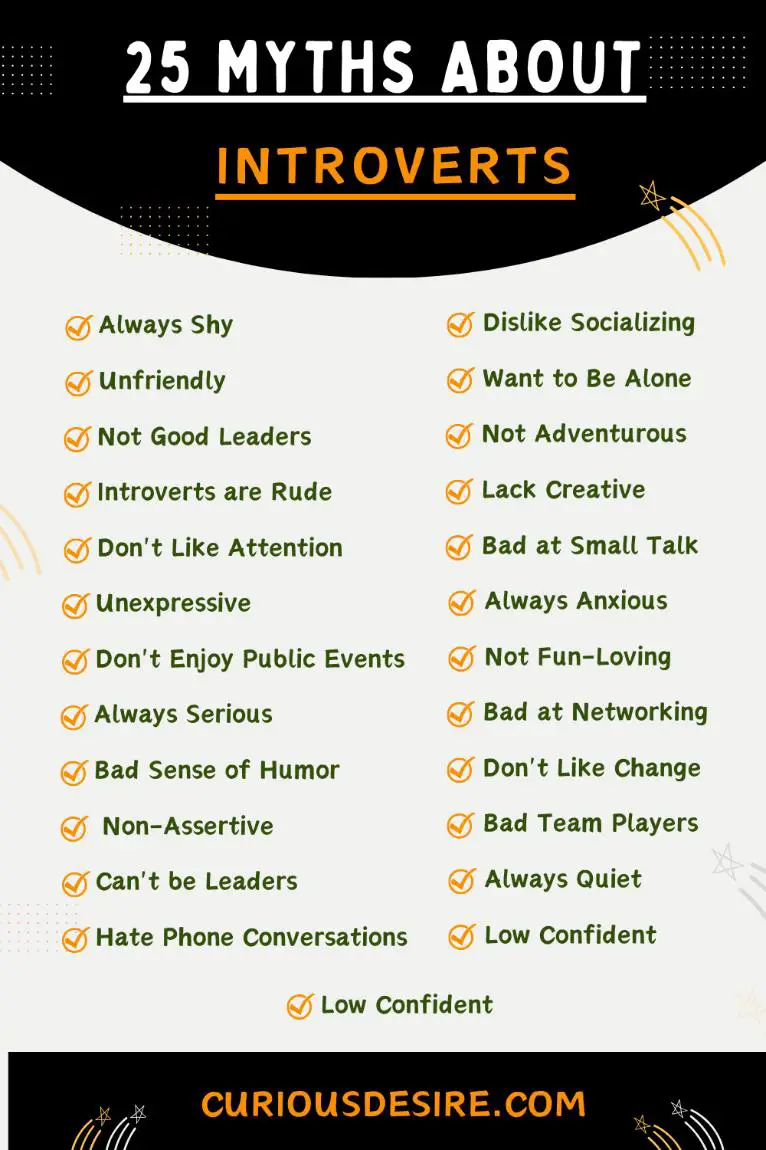In a world that often celebrates extroverted qualities, introverts find themselves surrounded by misconceptions and stereotypes.
These myths came from a limited understanding of introversion. In this blog post, we’ll clarify common myths about introverts, shedding light on the reality.
Let’s get started!
Here are the top 5 most common myths about introverts:
- Always shy.
- Don’t like socializing.
- Unfriendly.
- Always want to be alone.
- Bad leaders.
[toc]

Myth 1: Always Shy
Why this Myth exists:
The myth that introverts are always shy is a common misconception that stems from a misunderstanding of the terms “introversion” and “shyness.”
Busting the Myth:
While introversion and shyness can coexist, they are not synonymous. Therefore, introverts can be confident and outgoing.
Their preference for deeper connections and meaningful conversations is a distinctive trait and should not be confused with social anxiety.
Myth 2: Dislike Socializing
Why this Myth exists:
Introverts may not actively seek large social gatherings as frequently as extroverts, producing the misconception that they inherently dislike socializing.
Busting the Myth:
Introverts value meaningful connections and often prefer one-on-one or small-group interactions. They do enjoy socializing, emphasizing quality over quantity in their interactions.
Introverts frequently excel in forming strong, lasting relationships in more intimate settings.
Myth 3: Unfriendly
Why this Myth exists:
The reserved nature of introverts can be misinterpreted as unfriendliness, particularly when they don’t initiate conversations or outwardly express warmth.
Busting the Myth:
Introverts are not unfriendly; rather, they express warmth differently. While they may take time to open up, they form deep, meaningful connections and exhibit genuine interest in others.
Just because introverted people are quieter doesn’t mean they’re unfriendly.
Myth 4: Want to Be Alone
Why this Myth exists:
Introverts might be misunderstood as always wanting to be alone because they may decline invitations to large social events or need time alone after socializing.
Busting the Myth:
While introverts appreciate alone time for recharging, they also value social interactions.
Striking a balance between solitude and socializing is key for introverts to maintain optimal energy levels.
Myth 5: Not Good Leaders
Why this Myth exists:
Introverts are often perceived as lacking assertiveness and charisma, characteristics stereotypically associated with effective leadership.
Busting the Myth:
Introverts can be highly effective leaders, excelling in leading by example, active listening, and thoughtful decision-making.
Their strategic thinking and ability to consider diverse perspectives challenge the notion that leadership effectiveness is solely dependent on extroverted qualities.
Myth 6: Not Adventurous
Why this Myth exists:
The view that introverts are not adventurous exists due to a stereotypical association between introversion and a more reserved or cautious nature.
Busting the Myth:
Introverts can be just as adventurous, seeking meaningful and immersive experiences aligned with their values and interests.
While they may not be drawn to adrenaline-pumping situations, they appreciate and actively seek out experiences that foster personal growth.
Myth 7: Introverts are Rude
Why this Myth exists:
The reserved nature of introverts may be misconstrued as aloofness or rudeness in social situations.
Busting the Myth:
Introverts are not inherently rude; their approach to social interactions is thoughtful, and they may take time to open up.
Their preference for deeper, more meaningful conversations should not be mistaken for a lack of manners; rather, it reflects their authenticity and a genuine connection-seeking approach.
Myth 8: Lack Creative
Why this Myth exists:
Introverts may not always express creativity in extroverted ways, contributing to the belief that they lack creativity.
Busting the Myth:
Introverts are highly creative individuals who often channel their creativity into individual pursuits requiring deep focus and introspection.
Even if introverts don’t always show off their creativity loudly, they bring lots of cool ideas to different creative things.
They contribute a bunch because they think in their own special and careful ways.
Myth 9: Don’t Like Attention
Why this Myth exists:
The perception that introverts don’t like attention exists because introverted individuals often prefer a more low-key and reserved approach to social interactions.
Busting the Myth:
While introverts may not actively seek attention for its own sake, they can handle it well when it comes their way. They often prefer recognition for their accomplishments rather than seeking attention for personal reasons.
Introverts can shine in focused, individual tasks, and when they receive attention, it’s usually for their competence and contributions.
Myth 10: Bad at Small Talk
Why this Myth exists:
Introverts’ preference for deeper conversations over casual small talk can lead to the assumption that they lack the skill or interest to engage in lighter social interactions.
Busting the Myth:
Introverts may not be fans of superficial small talk, but they can navigate it skillfully when needed.
They appreciate meaningful conversations and may struggle with banalities, but this doesn’t mean they lack the ability to engage in light social chatter.
Introverts can adapt their communication style based on the context and the individuals involved.
Myth 11: Unexpressive
Why this Myth exists:
The reserved nature of introverts may be misinterpreted as a difficulty in expressing thoughts and emotions.
Busting the Myth:
Introverts express themselves effectively, often through writing, art, or thoughtful verbal communication.
While they may not be as outwardly expressive as extroverts, introverts excel at articulating their ideas in a clear and meaningful way.
They may prefer to express themselves in more considered ways rather than through immediate, extemporaneous speech.
Myth 12: Always Anxious
Why this Myth exists:
The introspective nature of introverts may be mistaken for anxiety, especially in social situations.
Busting the Myth:
Introverts are not always anxious; their preference for reflection and internal processing can be misconstrued as nervousness.
Introverts may thrive in quieter, calmer environments, but this doesn’t mean they are constantly anxious.
They appreciate thoughtful and measured interactions, which can be misinterpreted as reserved or uneasy.
Myth 13: Don’t Enjoy Public Events
Why this Myth exists:
The preference for smaller, more intimate gatherings may lead to the assumption that introverts don’t enjoy large public events.
Busting the Myth:
Introverts can enjoy public events when they align with their interests.
While they may find large crowds draining, they can still appreciate and engage in events that cater to their passions.
Introverts may choose events that allow for meaningful connections and experiences over those that are solely focused on socializing.
Myth 14: Not Fun-Loving
Why this Myth exists:
The misconception arises from the assumption that introverts’ reserved nature means they lack a fun-loving and spontaneous side.
Busting the Myth:
Introverts are indeed fun-loving; they simply express it differently.
They may prefer activities that align with their interests, such as quiet nights with close friends, engaging in hobbies, or exploring meaningful experiences.
The idea that introverts don’t enjoy fun overlooks the depth and authenticity they bring to their chosen activities.
Myth 15: Always Serious
Why this Myth exists:
Introverts’ preference for thoughtful conversations and a more reserved demeanor may lead to the assumption that they are always serious.
Busting the Myth:
Introverts can have a great sense of humor and appreciate lighthearted moments.
While they may not always express their humor in an extroverted manner, they often contribute wit, sarcasm, or clever insights to conversations.
Introverts’ humor tends to be more nuanced, reflecting their unique perspectives on life.
Myth 16: Bad at Networking
Why this Myth exists:
Introverts may not actively seek out networking events or engage in extensive small talk, leading to the misconception that they are not good at networking.
Busting the Myth:
Introverts may approach networking differently, focusing on building soulful connections rather than collecting a vast number of contacts.
They excel in one-on-one interactions, allowing them to form authentic relationships.
Introverts leverage their listening skills and thoughtfulness, making networking a strategic and purposeful activity rather than a purely social one.
Myth 17: Bad Sense of Humor
Why this Myth exists:
In larger or more boisterous gatherings, introverts may not be as vocal with their humor, leading others to assume they don’t have a good sense of humor at all.
Busting the Myth:
Introverts have a distinct and often subtle sense of humor. They may appreciate wit, sarcasm, or clever wordplay and express their humor in a thoughtful and understated manner.
While they may not be the center of attention cracking jokes, introverts often contribute to humor through their observational and clever insights.
Myth 18: Don’t Like Change
Why this Myth exists:
Introverts may need time to adapt to new circumstances, and they might feel more comfortable in familiar, predictable environments.
This preference for stability can be misinterpreted as resistance to change.
Busting the Myth:
Introverts may prefer a degree of stability, but this doesn’t mean they are averse to change.
They appreciate well-thought-out and purposeful changes that align with their values.
Introverts can adapt to new situations with grace and may even thrive in environments that allow for individual reflection and adjustment.
Myth 19: Non-Assertive
Why this Myth exists:
Introverts’ quieter attitude and preference for thoughtful communication may be misconstrued as a lack of assertiveness.
Busting the Myth:
Introverts can be assertive, but their assertiveness may manifest differently than extroverts.
They often prioritize quality over quantity in their communication and may choose moments to assert themselves thoughtfully.
Introverts bring a valuable balance to assertiveness, combining it with careful consideration and respect for others.
Myth 20: Bad Team Players
Why this Myth exists:
The myth may persist because introverts may not always express themselves as assertively in group settings as extroverts do.
They may prefer to contribute in a more thoughtful or one-on-one manner, leading others to misconstrue their behavior as a lack of teamwork or collaboration.
Busting the Myth:
Introverts are excellent team players. They bring qualities such as active listening, thoughtful contributions, and a focus on collaboration.
While they may not seek the spotlight within a team, introverts often contribute significantly to the team’s success through their ability to analyze information, solve problems, and work cohesively with others.
Myth 21: Can’t Enjoy Leadership Roles
Why this Myth exists:
The assumption that effective leaders must be outgoing and extroverted contributes to the belief that introverts don’t enjoy leadership roles.
Busting the Myth:
Introverts can be exceptional leaders. They bring qualities such as empathy, thoughtful decision-making, and the ability to listen to the table.
While they may not seek the spotlight, introverted leaders can inspire and guide their teams through strategic thinking and a focus on individual strengths.
Effective leadership is about a combination of skills, not solely extroverted traits.
Myth 22: Always Quiet
Why this Myth exists:
Introverts’ tendency to be more reserved in social settings may lead to the assumption that they are always quiet.
Busting the Myth:
Introverts can be outgoing and expressive in the right circumstances. While they may not be as outwardly expressive as extroverts, they can engage in lively conversations, express enthusiasm, and connect deeply with others.
Introverts’ reserve is often a reflection of their selective social interactions rather than a constant state of quietness.
Myth 23: Don’t Like Phone Conversations
Why this Myth exists:
Introverts’ preference for written communication or face-to-face interactions may lead to the assumption that they dislike talking on the phone.
Busting the Myth:
Introverts can engage in phone conversations effectively. It’s not about a dislike for the medium; rather, they may prefer other forms of communication.
Introverts often appreciate phone calls when they provide an opportunity for meaningful and focused dialogue, allowing them to connect on a deeper level.
Myth 24: Low Confident
Why this Myth exists:
Introverts can not always exhibit the same level of outward confidence as extroverts, especially in social or group settings.
Introverts may take a more measured and thoughtful approach to expressing themselves, which can be mistaken for a lack of confidence.
Busting the Myth:
Introverts can be highly confident individuals. Their confidence may not manifest in overt ways, such as dominating conversations, but rather in their competence, deep knowledge, and ability to make well-thought-out decisions.
Introverts often express confidence through their actions and the quality of their work.
Myth 25: Poor at Building Relationships
Why this Myth exists:
Introverts’ more selective approach to social interactions may lead to the assumption that they struggle to build and maintain relationships.
Busting the Myth:
Introverts excel at building meaningful, deep relationships. While they may not have an extensive circle of acquaintances, they value quality over quantity.
Introverts invest time and energy in cultivating genuine connections, leading to long-lasting and fulfilling relationships.
Introverts Myths FAQs
1. What does psychology say about introverts?
Psychologically, introversion is typically characterized by a preference for quieter, more reflective environments. Introverts may recharge by spending time alone, and they often engage in more profound internal processing of information.
This preference is not indicative of shyness or social anxiety but rather a different way of interacting with the world.
2. What are the 4 things introverts do?
Introverts are often characterized by four key traits:
- Preference for Solitude: Introverts recharge by spending time alone.
- Thoughtful Communication: They may prefer depth in conversations over small talk.
- Observant and Reflective: Introverts often engage in internal processing of information.
- Selective Socializing: They may prefer a few close relationships over a large social circle.
3. What is the theory of introverts?
One prominent theory is Carl Jung’s concept of introversion and extraversion. According to Jung, introversion and extraversion are innate personality traits, with introverts focusing more on their inner world of thoughts and feelings rather than external stimuli.
4. Why introverts are criticized?
Introverts may be criticized due to misconceptions and societal bias favoring extroverted traits. Their preference for solitude and quieter settings can be misunderstood as aloofness or antisocial behavior.
5. Why I don’t like introverts?
Disliking introverts may stem from misunderstanding their behaviors or preferences. It’s important to recognize and appreciate the diversity of personalities, as introverts bring unique strengths to various situations.
6. Why introverts don’t trust easily?
Introverts may take time to trust others as they value deep connections and meaningful relationships. Building trust involves sharing vulnerabilities, and introverts may be cautious in doing so.
7. How do introverts show love?
Introverts express love in various ways, such as through thoughtful gestures, meaningful conversations, and acts of service. They may not always be overtly expressive but often demonstrate love through genuine and consistent actions.
8. Are introverts very loyal?
Yes, introverts tend to be loyal in relationships. Their preference for a few close connections means they invest deeply in those relationships, fostering a strong sense of loyalty.
9. Why is it so difficult for introverts?
Introverts may find certain social situations challenging due to their preference for solitude, sensitivity to stimuli, and the societal expectation for extroverted behaviors. These challenges can lead to feelings of exhaustion or discomfort.
10. Why are introverts so misunderstood?
Misunderstandings about introverts arise from societal biases, misconceptions, and a lack of awareness about the diverse ways people engage with the world. The quiet and introspective nature of introverts may be misinterpreted as disinterest or unfriendliness.
11. Why do people ignore introverts?
People may unintentionally ignore introverts due to their quieter presence and less assertive communication style. It’s essential for individuals to recognize and value the contributions of introverts in various settings.
12. Why do people annoy introverts?
Introverts may be annoyed by situations that involve excessive stimulation, shallow conversations, or forced socializing. Respect for their need for solitude and understanding their preferences can contribute to better interactions.
13. How do introverts act when angry?
When angry, introverts may prefer to retreat and process their emotions internally. They might need some time alone to cool off and collect their thoughts before addressing the issue.
14. Why are introverts scared to talk?
Introverts may feel anxious about talking in certain situations due to a fear of judgment, a preference for thoughtful communication, or a sensitivity to overstimulation in social settings.
15. Do introverts get mad easily?
Introverts, like anyone else, vary in their emotional responses. They may not express anger outwardly, but when pushed beyond their limits, they can become upset. The key is that their reactions might be more subdued compared to extroverts.


